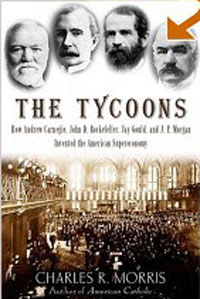Morris profiles the four big "robber barons" of post-Civil War America: Andrew Carnegie, steel magnate, characterized as annoying and cruel; John D. Rockefeller, the direct and understated visionary who founded Standard Oil; Jay Gould, perhaps the most vilified of them all, who made his fortune in railroads; and J. P. Morgan, who, groomed for the financial trade, became the world"s banker. Although all four would probably have excelled in any era, it was the machine age, the move from an agricultural to a manufacturing society, and the concurrent rise of mass consumption, that created an environment for their megasuccess. Morris shows how the inventiveness and spirit of the American worker in the later 1800s led to a surge of growth that had the U.S. roaring past Great Britain to become the world"s top producer. "Scientific Management" of factories created interchangeable parts and assembly lines, bringing branded foods and labor-saving home appliances to the people. Morris brings home how the rapid expansion produced a "supply shock" that overshadows any so-called paradigm shift that we may be experiencing today. Это и многое другое вы найдете в книге The Tycoons: How Andrew Carnegie, John D. Rockefeller, Jay Gould, and J. P. Morgan Invented the Amer (Charles R. Morris)
The Tycoons: How Andrew Carnegie, John D. Rockefeller, Jay Gould, and J. P. Morgan Invented the Amer Charles R. Morris
Подробная информация о книге «The Tycoons: How Andrew Carnegie, John D. Rockefeller, Jay Gould, and J. P. Morgan Invented the Amer Charles R. Morris». Сайт не предоставляет возможности читать онлайн или скачать бесплатно книгу «The Tycoons: How Andrew Carnegie, John D. Rockefeller, Jay Gould, and J. P. Morgan Invented the Amer Charles R. Morris»
